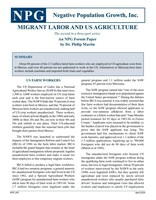A Critical Examination of Options to Reduce Dependence on Hand Labor
ALEXANDRIA, Va., April 11, 2024 /PRNewswire-PRWeb/ -- Negative Population Growth, Inc. (NPG) announces the publication of a pivotal Forum paper, , by professor Dr. Philip Martin. The paper explains who works for wages on US farms and highlights the need for a nuanced discourse on the impacts of immigration and trade policy regarding foreign farm workers. The publication is the second in a series of three (to be released consecutively) that examine industries that employ high shares of illegal immigrant workers.
Most US farm workers, about 80% of the 2.5 million hired farmworkers, hail from Mexico, and over 40% work without authorization in the US. These figures, based on National Agricultural Worker Survey data, explain why policymakers find it so difficult to reform current immigration programs.
Dr. Martin outlines the debate over farm labor immigration reforms, from the Immigration Reform and Control Act (IRCA) to the Farm Workforce Modernization Act, that promise a fully legal farm workforce. He sheds light on the demographics and economics of H-2A guest workers, providing insight into the human and financial costs associated with this program.
This paper analyzes the pivotal role that immigrant laborers have played in sustaining the subsector of US agriculture that hand harvests fresh fruits, vegetables, and horticulture specialty crops. Farm owners must decide how to respond to rising farm labor costs, and how to encourage workers to embrace technological innovations in machinery, artificial intelligence, and robotics.
Dr. Martin emphasizes that moving forward requires farmers to decide where to invest—mechanization of labor-intensive agriculture, infrastructure for guest workers, or relocating production overseas, noting: "Immigration and trade policies affect agricultural investment decisions. If policy changes make it easier to employ guest workers and harder to import fresh produce, there is likely to be more US production based on guest workers. A more restrictive immigration and guest worker policy coupled with free trade would reduce agriculture's long-time dependence on newcomers with few other US job options."
This timely work invites policymakers, NPG members, advocates, and the public to contemplate US agriculture's future. It highlights the importance of immigration and trade policies to shape the future of farming—prompting a weighing of factors such as domestic production versus import reliance and the nature of labor procurement policies.
Since 1972, NPG has worked to educate both the public and policy leaders about the impacts of overpopulation. With a steadfast commitment to reducing population growth to achieve a sustainable balance with our environmental resources, NPG continues to be a leading voice of reason in a world often driven by the pursuit of perpetual growth. NPG advocates the adoption of its , with the goal of eventually stabilizing U.S. population at a sustainable level – far lower than today's. We do not simply identify the problems – we propose solutions. For more information, visit our website at , follow us on Facebook or follow us on Twitter .
Media Contact
Craig Lewis, Negative Population Growth, 703-370-9510, [email protected],
SOURCE Negative Population Growth


Share this article